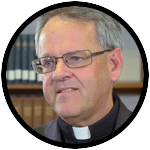
Father Thomas Dailey, O.S.F.S.
The party is over. The guests have all gone home.
The host offered them parting words and a souvenir. They took a group photo, “sent” a video letter to fellows around the world, and agreed on a text in memory of their visit.
But now that the Synod on Young People has ended, what happens next?
Those who organized the month-long dialogue certainly seek some follow-up. The synod’s final document notes that “the end of the working assemblies and the document that gathers together its fruits do not close the synodal process, but constitute one stage of it” (no. 120). It then invites a continuation of “synodality” on the national and local levels, even dictating the style (“fraternal listening and intergenerational dialogue”) that should characterize it (no. 120). This, it makes clear, is the way of the Church “toward which we are called to convert ourselves” (no. 121).
The document urges that “youthful protagonism” be at the heart of the post-synod activity – not just doing something “for them” but living in communion “with them” as we “grow together in our understanding of the Gospel and in seeking out the most authentic ways of living it and giving witness to it.”
[hotblock]
After all, “the responsible participation of young people in the life of the Church is not optional, but an exigency of the baptismal life and an indispensable element for the life of every community” (no. 116).
As a call to action, that’s all well and good, indeed admirable. But at the national level, it will prove challenging given the already full slate of pressing matters that otherwise demand the bishops’ attention. At the local level, some such efforts may be possible, but the outcome depends to a great extent on how young people, themselves, answer an age-old inquiry:
“What about you? What are you going to do?”
In 1887 Pope Leo XIII posed those pointed questions to Katharine Drexel, who as a young adult (age 29) sought that pope’s assistance with the missions that she and her sisters were financing with their family inheritance. Her answer set her on the road to sainthood, impelling her to establish and sustain a religious congregation (the Sisters of the Blessed Sacrament) dedicated to the service of Native and African Americans who suffered from persecution and despair.
During his visit to the USA, the current pope reiterated that question at the cathedral that is now home to the saint’s new tomb. “Those words changed Katharine’s life,” preached Pope Francis, “because they reminded her that, in the end, every Christian man and woman, by virtue of baptism, has received a mission. Each one of us has to respond, as best we can, to the Lord’s call to build up his Body, the Church.”
“What about you?” is the question now asked of young adults, who represent not just the future hope of the Church but its present mission. “By way of the holiness of young people,” the synod’s final document concludes, “the Church can renew its spiritual ardor and its apostolic vigor” (no. 167).
Along the way to that renewal, the Church’s “millennials, cuspers and homelanders” can look for guidance to the biblical generation, specifically those disciples on the road to Emmaus (Luke 24:13-35). Having first walked away from the holy city, they encountered the Risen Lord, listened to him with burning hearts, and sat with him around the table made sacred by his presence and sacramental action. Then, equipped for the journey with a newfound recognition and experience of real joy, they walked back to the place where their companions remained. There they shared the Good News with them.
We in the older generations often lament that young people are walking away from religion. But research by the Catholic Leadership Institute indicates that a majority of young people still value their connection with the Church, with 75 percent of respondents indicating that they attend Mass on a daily or weekly basis.
Unfortunately, only 40 percent of those young respondents strongly agree that they experience vibrant and engaging Sunday Masses, and a mere 31 percent strongly agree that their parish is helping to form them as disciples of Jesus Christ.
“What are you going to do?” is therefore a question for all ages in the Church. How might we provide more positive experiences of faith formation with and for young adults? How can we engage them together in the joyful celebration and missionary proclamation of the hope we share?
The road ahead beckons our response.
***
Father Dailey is the John Cardinal Foley Chair of Homiletics and Social Communications at St. Charles Borromeo Seminary, Wynnewood, and a research fellow for the Catholic Leadership Institute in Wayne.
PREVIOUS: Imagination: The open road where God speaks to us
NEXT: After the synod on youth, be present



Share this story